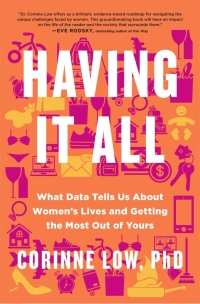 Cover image for *Having It All: What Data Tells Us About Women's Lives and Getting the Most Out of Yours* by Corinne Low, PhD
Cover image for *Having It All: What Data Tells Us About Women's Lives and Getting the Most Out of Yours* by Corinne Low, PhD
I’ve been talking about this book to anyone who will listen, ever since I had the chance to proofread it.
So often, I work on fiction or memoir. It was a treat to step into this world of data and ideas. As an economist and professor at Wharton, Corinne Low insists that no one-size-fits-all goal exists to describe happiness. Any self-help book that assumes people of all genders are aiming to maximize the same result, such as money or fame, will be inherently flawed, according to the author. Instead, Low advocates for calculating your own “personal utility function,” which accounts for both indirect means to fulfillment and direct fulfillment. If you love your job, for example, you might get indirect utility (wages) and direct utility (enjoyment) from it. Although no one is likely to pay you for spending time with your kids, the direct utility of doing so has value, nonetheless. We all get to make our own individual valuations in these matters, and Low provides the tools to do so. I don’t have a background in economics, but this idea seems to me like a refreshing take.
The author talks overtly about pushing back on business books like Lean In that advocate for women to take a certain approach to workplace leadership. She states this eloquently in the book, and also on an interview on the Women of Letters podcast, which I enjoyed. There isn’t any data, she says, that illustrates the efficacy of certain gendered traits over others. In her words:
“Research indeed underscores that women show differences in multiple traits compared to men, in a variety of settings […]. But none of the literature has demonstrated that the traits women exhibit more than men are actually bad from a profit or productivity perspective.” (90)
Perhaps it’s not women who need to change, Low suggests. Society, on the other hand, could benefit from looking at the data and adjusting how it values different styles of work and leadership. I love this message and the deep breath it lets me take as I navigate life’s twists and turns.
Low makes a lot of other compelling arguments. She also synthesizes important data that needs to be discussed over dinner tables around the globe. Parents of this generation, for example, are investing more time in their kids than their parents did, even as modern careers require workers to spend more time at their jobs, an equation that does not tend to produce a good deal for women.
I could go on, but the author makes these points so well, why not go grab yourself a copy of Having It All and absorb them right from the source?